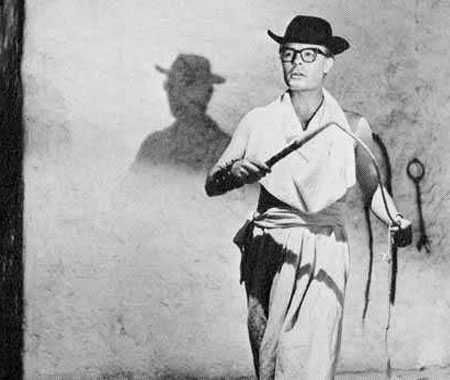Bess is a simple woman. She loves her family, cares for her church, listens to her God and deeply, desperately, obsessively loves her new husband, Jan. She can't stand to be apart from him, but his job as an oil rig worker forces him to be away from her for months at a time. It is at this point that Bess begins making deals with God, to get him back no matter what the cost.
Lars Von Trier is often accused of being a misogynist, because of the excessive abuses that he puts his female characters through. Certainly the abuses in Nymphomania, Dancer in the Dark, Dogville, this film and especially Antichrist are varied and of the deepest horror, and one might question the imagination of a man who creates such violence to such lovely women.
But placing the blame on Von Trier is, I think, missing the point. Von Trier is not the enemy, and he is not punishing these women for the sin of being women. Rather, he is displaying what happens in a patriarchal society. Each of these films show a different aspect of patriarchal abuses. Dancer in the Dark shows a helpless woman, caught in a web of a man's desire; Antichrist shows male jealousy and power, Dogville displays the blame society places on the vulnerable and Nymphomania shows how a woman's self abuse can occur in a society focused on men's sexual desire.
Breaking the Waves takes place in an extremely patriarchal society, in which only men are given a voice in the community, women are expected to be submissive and obey what the men order or else they are exiled from the community. The film takes Bess, the dearest and gentlest of souls, and shows how patriarchy, just by being patriarchy, destroys her bit by bit. She has the most loving husband and a sister in law who does everything they can to help her, but even with this kind of support, they cannot stop the voice of patriarchy in her head, which she considers to be the voice of God.
In a sense, this film displays the most insidious and evil part of patriarchy-- the voice of harsh judgment and punishment within the heads of the vulnerable and helpless, so that they never can escape the marionette strings that bind them, even if alone. Freedom is never an option, nor is love, even when true love is found.
This is a terrible, but important film to witness.
Lars Von Trier is often accused of being a misogynist, because of the excessive abuses that he puts his female characters through. Certainly the abuses in Nymphomania, Dancer in the Dark, Dogville, this film and especially Antichrist are varied and of the deepest horror, and one might question the imagination of a man who creates such violence to such lovely women.
But placing the blame on Von Trier is, I think, missing the point. Von Trier is not the enemy, and he is not punishing these women for the sin of being women. Rather, he is displaying what happens in a patriarchal society. Each of these films show a different aspect of patriarchal abuses. Dancer in the Dark shows a helpless woman, caught in a web of a man's desire; Antichrist shows male jealousy and power, Dogville displays the blame society places on the vulnerable and Nymphomania shows how a woman's self abuse can occur in a society focused on men's sexual desire.
Breaking the Waves takes place in an extremely patriarchal society, in which only men are given a voice in the community, women are expected to be submissive and obey what the men order or else they are exiled from the community. The film takes Bess, the dearest and gentlest of souls, and shows how patriarchy, just by being patriarchy, destroys her bit by bit. She has the most loving husband and a sister in law who does everything they can to help her, but even with this kind of support, they cannot stop the voice of patriarchy in her head, which she considers to be the voice of God.
In a sense, this film displays the most insidious and evil part of patriarchy-- the voice of harsh judgment and punishment within the heads of the vulnerable and helpless, so that they never can escape the marionette strings that bind them, even if alone. Freedom is never an option, nor is love, even when true love is found.
This is a terrible, but important film to witness.




